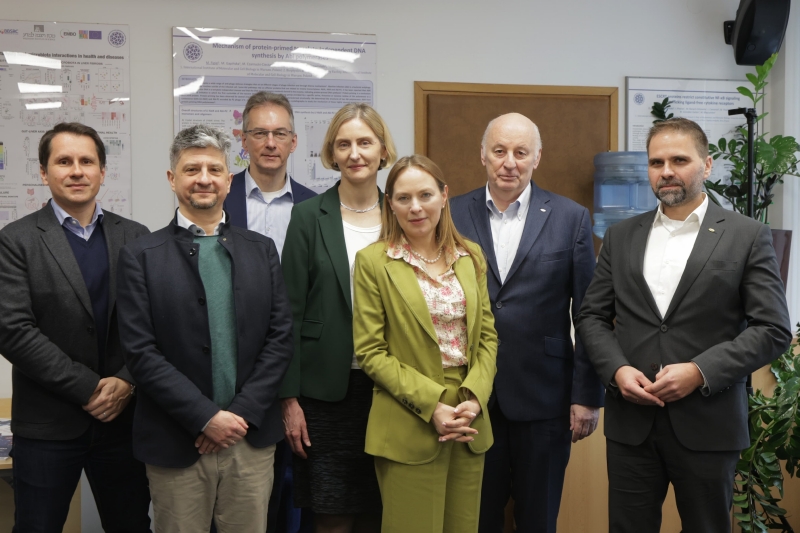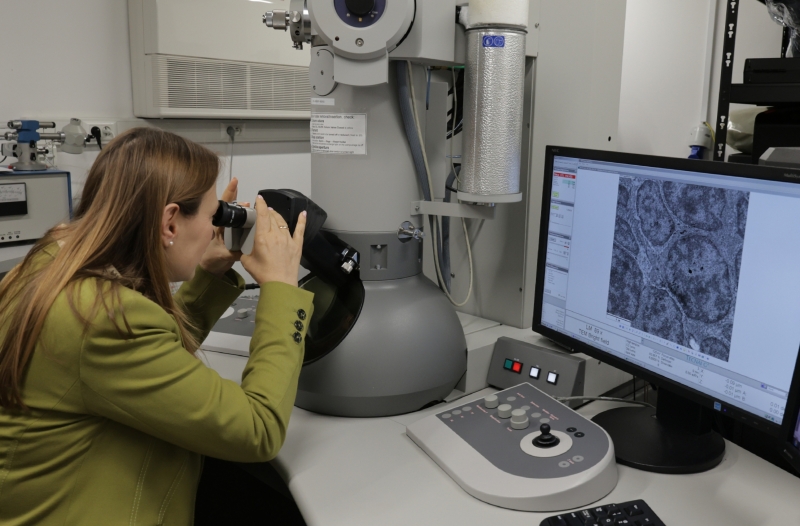Minister Katarzyna Pełczyńska-Nałęcz visited IIMCB

Polish scientific institutes are conducting research that can translate into innovative medical therapies and technological solutions. How to drive this development was the focus of discussions among participants at a meeting at the International Institute of Molecular and Cell Biology in Warsaw (IIMCB). The event brought together Minister of Development Funds and Regional Policy, Katarzyna Pełczyńska-Nałęcz, representatives of the Foundation for Polish Science (FNP), and leaders of IIMCB, ICTER, and CENTERA, who discussed the outcomes of current projects and the challenges facing Polish science.
The International Research Agendas (IRAP FENG) is one of the key research funding mechanisms in Poland, enabling the creation of new centers of scientific excellence. The program is managed and project selection (through a competitive process) is overseen by the Foundation for Polish Science. Funding comes from European Funds.
“In Poland, we need centers of excellence — places that enable world-class research and collaboration with the international scientific community. These centers are essential to attracting top researchers from both Poland and abroad. The more of these centers we have, the more competitive Polish science will become,” said Prof. Maciej Żylicz, President of the Foundation for Polish Science.
IIMCB and RACE-PRIME: A New Approach to Infectious and Rare Disease Therapies
One of the projects funded by European grants is RACE-PRIME (RNA and Cell Biology Platform for Research and Innovation in Medicine), an initiative by IIMCB that focuses on developing modern therapies for infectious and rare diseases. The project follows two main research directions: antiviral and antibacterial therapeutic strategies, as well as advanced models of rare diseases that could pave the way for personalized therapies.
“Through RACE-PRIME, we can conduct research that bridges fundamental science with real clinical applications. Our goal is to develop the foundations for innovative treatments for human diseases where current therapies are insufficient or unavailable,” said Prof. Marta Miączyńska, Director of IIMCB.
A decade ago, IIMCB had only six laboratories; soon, it will have twenty. However, this growth faces a significant barrier—a lack of its own headquarters. The institute operates in borrowed facilities, which are no longer able to accommodate the expanding research teams. A new building is not a future goal; it is an urgent necessity today. The institute is actively seeking funding for this purpose and is looking for partners to implement the investment through a public-private partnership model.
ICTER: Innovative Approaches to Eye Therapy and Diagnostics
ICTER is implementing the International Centre for Translational Eye Research project. Its goal is to develop safer surgical interventions, new therapies for eye diseases, and diagnostic methods that improve prognosis and restore vision.
“ICTER serves as a modern center of scientific excellence, focusing on developing innovative technologies that facilitate advanced eye treatment. There is a high demand for tools capable of validating new ophthalmic therapies, accelerating treatment processes, and reducing costs. Our ambitious goal is to implement these technologies to provide Polish patients with faster access. At the same time, we maintain a global perspective, positioning ourselves competitively among leading research centers and technology companies worldwide,” said Prof. Maciej Wojtkowski, Director of ICTER.
CENTERA: Breakthrough Technologies Based on the Terahertz Radiation Band
The CENTERA project (Center for Terahertz Research and Applications) is another initiative funded by IRAP FENG. The project was established to develop technologies utilizing the terahertz (THz) radiation band, which lies between infrared and microwaves. So far, it has not been widely exploited due to the lack of efficient, affordable emitters and detectors. However, it has the potential to offer a new "window to the world," enabling the creation of novel imaging systems for security surveillance, quality control, medical diagnostics, and agriculture. It is also critical for advancements in telecommunications.
“We are searching for new ways to generate and detect THz waves, allowing us to develop innovative emitters and detectors and expand their practical applications. This requires combining quantum physics, chemistry, materials engineering, electronic engineering, and programming. I believe we are making progress, as two of our researchers have already been awarded the prestigious ERC Advanced Grant. Our location at the Centre for Advanced Materials and Technologies (CEZAMAT) of Warsaw University of Technology is undoubtedly beneficial. We are currently seeking new sources of funding to strengthen the applied side of the project,” said Dr. Lech Trzeciak from the CENTERA management group.
New Opportunities for Polish Science
During the meeting, participants emphasized the importance of research funding and international cooperation. On March 17, the Foundation for Polish Science launched a new call for proposals under the IRAP FENG program, targeted at institutions coordinating consortia that have received funding or the Seal of Excellence in the Teaming program under Horizon Europe. On April 1, FNP will announce a general call for applications, opening another opportunity for Polish institutes to join the forefront of global science. The International Research Agendas Measure receives funding through the European Funds for Smart Economy (FENG) programme.
The meeting, held on March 14 at IIMCB, was attended byMinister of Development Funds and Regional Policy, Prof. Maciej Żylicz (President of FNP), Prof. Krzysztof Pyrć (President-elect of FNP), Prof. Maciej Wojtkowski (Director of ICTER), Dr. Lech Trzeciak (member of the CENTERA management group), and Prof. Marta Miączyńska (Director of IIMCB). Participants also had the opportunity to tour the IIMCB laboratories and explore the infrastructure of the institute.
Photos: Ministry of Development Funds and Regional Policy
RACE-PRIME project: RNA and Cell Biology Platform for Research and Innovation in Medicine

